1a-国际商务英语-大学课件
- 格式:ppt
- 大小:647.00 KB
- 文档页数:15
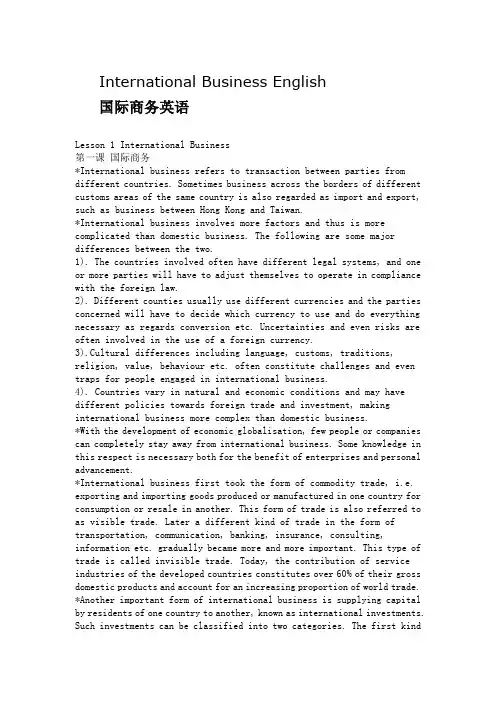
International Business English国际商务英语Lesson 1 International Business第一课国际商务*International business refers to transaction between parties from different countries. Sometimes business across the borders of different customs areas of the same country is also regarded as import and export, such as business between Hong Kong and Taiwan.*International business involves more factors and thus is more complicated than domestic business. The following are some major differences between the two.1). The countries involved often have different legal systems, and one or more parties will have to adjust themselves to operate in compliance with the foreign law.2). Different counties usually use different currencies and the parties concerned will have to decide which currency to use and do everything necessary as regards conversion etc. Uncertainties and even risks are often involved in the use of a foreign currency.3).Cultural differences including language, customs, traditions, religion, value, behaviour etc. often constitute challenges and even traps for people engaged in international business.4). Countries vary in natural and economic conditions and may have different policies towards foreign trade and investment, making international business more complex than domestic business.*With the development of economic globalisation, few people or companies can completely stay away from international business. Some knowledge in this respect is necessary both for the benefit of enterprises and personal advancement.*International business first took the form of commodity trade, i.e. exporting and importing goods produced or manufactured in one country for consumption or resale in another. This form of trade is also referred to as visible trade. Later a different kind of trade in the form of transportation, communication, banking, insurance, consulting, information etc. gradually became more and more important. This type of trade is called invisible trade. Today, the contribution of service industries of the developed countries constitutes over 60% of their gross domestic products and account for an increasing proportion of world trade. *Another important form of international business is supplying capital by residents of one country to another, known as international investments. Such investments can be classified into two categories. The first kindof investments, foreign direct investments or FDI for short is made for returns through controlling the enterprises or assets invested in in a host country.*The host country is a foreign country where the investor operates, while the country where the headquarters of the investor is located is called the home country. The second kind of investment, portfolio investment, refers to purchases of foreign financial assets for a purpose other than controlling. Such financial assets may be stocks, bonds or certificates of deposit.Stocks are also called capital stocks or bonds. Bonds are papers issued by a government or a firm with promise to pay back the money lent or invested together with interest. The maturity period of a bond is at least one year, often longer, for example five, or even ten years. Certificates of deposit generally involve large amounts, say 25 thousand US dollars *Besides trade and investment, international licensing and franchising are sometimes taken as a means of entering a foreign market. In licensing, a firm leases the right to use its intellectual property to a firm in another country. Such intellectual property may be trademarks, brand names, patents, copyrights or technology. Firms choose licensing because they do not have to make cash payments to start business, and can simply receive income in the form of royaltyBesides, they can benefit from locational advantages of foreign operation without any obligations in ownership or management. The use of licensing is particularly encouraged by high customs duty and non-tariff barriers on the part of the host country. However it is not advisable to use licensing in countries with weak intellectual property protection since the licensor may have difficulty in enforcing licensing agreement.*Franchising can be regarded as a special form of licensing. Under franchising, a firm, called the franchisee, is allowed to operate in the name of another, called the franchiser who provides the former with trademarks, brand names, logos, and operating techniques for royalty. In comparison with the relation between the licenser and the licensee, the franchiser has more control over and provides more support for the franchisee.*The franchiser can develop internationally and gain access to useful information about the local market with little risk and cost, and the franchisee can easily get into a business with established products or services. Franchising is fairly popular especially in hotel and restaurant business.*Other forms for participating in international business are management contract, contract manufacturing, and turnkey project.*Under a management contract, one company offers managerial or other specialized services to another within a particular period for a flat payment or a percentage of the relevant business volume. Sometimes bonusesbased on profitability or sales growth are also specified in management contracts.Government policies often have a lot to do with management contracts. When a government forbids foreign ownership in certain industries it considers to be of strategic importance but lacks the expertise for operation, management contracts may be a practical choice enabling a foreign company to operate in the industry without owning the assets*By contract manufacturing, a firm can concentrate on their strongest part in the value chain, e.g. marketing, while contracting with foreign companies for the manufacture of their products. Such firms can reduce the amount of their resources devoted to manufacture and benefit from location advantages from production in host countries. However, loss of control over the production process may give rise to problems in respect of quality and time of delivery.*For an international turnkey project, a firm signs a contract with a foreign purchaser and undertakes all the designing, contracting and facility equipping before handing it over to the latter upon completion. Such projects are often large and complex and take a long period to complete. Payment for a turnkey project may be made at fixed total price or on a cost plus basis. The latter way of payment shifts the burden of possible additional cost over the original budget onto the purchaser *BOT is a popular variant of the turnkey project where B stands for Build, O for operate and T for transfer. For a BOT project, a firm operate a facility for a period of time after building it up before finally transferring it to a foreign company. Making profit from operating the project for a period is the major difference between BOT and the common turnkey project. Needless to say, the contractor has to bear the financial and other risks that may occur in the period of operation.*Some Words and Expressionscustoms area 关税区in compliance with 遵从,遵照conversion n.货币兑换visible trade 有形贸易resale n.转售invisible trade 无形贸易gross domestic product 国内生产总值for short 缩写为account for 占……比例headquarters n.总部trap n.陷阱,圈套portfolio investment 证券投资stocks n.股票bonds n.债券maturity n.(票据等)到期,到期日certificate of deposit 大额存单other than 而不是licensing n.许可经营franchising n.特许经营n.商标advisable adj.可行的,适当的patent n.专利royalty n.专利使用费,许可使用费,版税copyright n.版权licensor n.给予许可的人licensee n.接受许可的人franchiser n.给予特许的人franchisee n.接受特许的人logo n.标识,标记management contract 管理合同expertise n.专门知识bonus n.红利,奖金,津贴flat adj.一律的,无变动的contract manufacturing 承包生产value chain 价值链turnkey project 交钥匙工程BOT(Build, Operate, Transfer)建设,经营,移交Stand for 表示,代表variant n.变形,变体Lesson twoIncome Level and the World Market第二课收入水平和世界市场This lesson discusses the relation between the income level and the market potential, and the features of high income, middle income and low income markets.Special analyses are made on Triad, i.e. the markets of North America,European Union and Japan, as well as other markets that are closely related with China.The first two paragraphs mainly deal with GNP and GDP, two important concepts usedto indicate the total size of an economy. GDP, Gross Domestic Product, stresses the place of production while GNP, Gross National Product, on the ownership of production factors.GDP is used by most countries now where as GNP was more popular before the 1990s. The actual figures of a country’s GNP and GDP are, however, quite similar in most cases and we can use whichever figure that is available.TEXT:In assessing the potential of a market, people often look at its income level since it provides clues about the purchasing power of its residents. The concepts national income and national product have roughly the same value and can be used interchangeably if our interest is in their sum total which is measured as the market value of the total output of goods and services of an economy in a given period, usually a year. The differenceis only in their emphasis. The former stresses the income generated by turning out the products while the latter, the value of the product s themselves. Gross National Product, GNP, and Gross Domestic Product, GDP, are two important concepts used to indicate a country’s total income. GNP refers to the market value of goods and services produced by the property and labor owned by the residents of an economy. This term was used by most governments before the 1990s国民生产总值(GNP)是最重要的宏观经济指标,它是指一个国家地区的国民经济在一定时期(一般1年)内以货币表现的全部最终产品(含货物和服务)价值的总和。
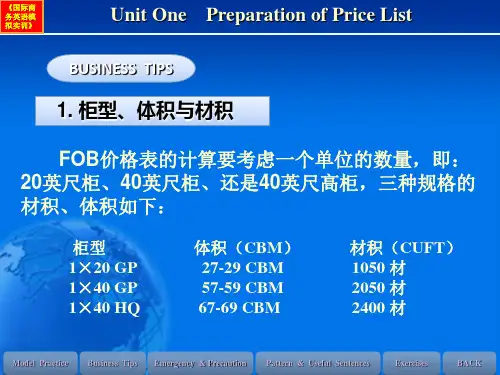
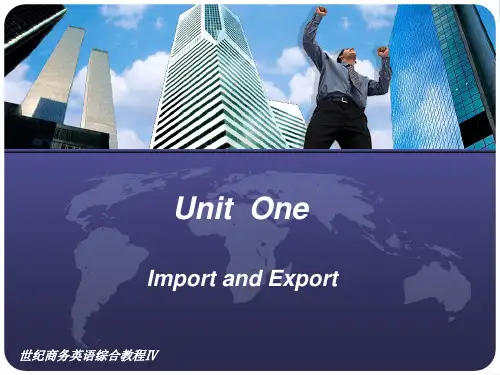




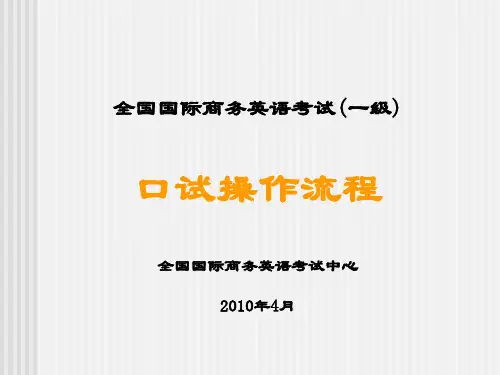
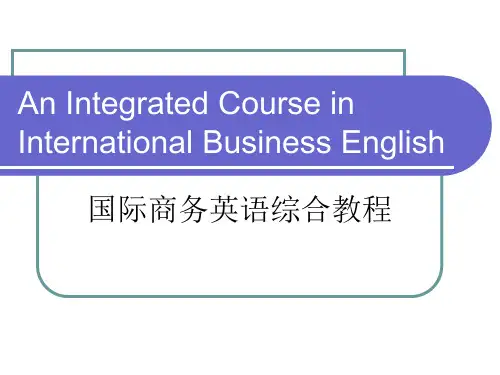
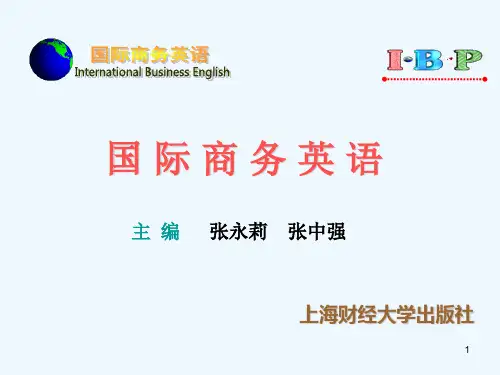

精选文档Lesson 1 InternationalBusiness 〔国际商务〕★I nternational business refers to transaction between parties 〔当事人、参加者〕 from differentcountries. Sometimes business across the borders of different customs areas〔关税区〕of the same country is also regarded as import and export, such as business between Hong Kong and Taiwan.International business involves more factors and thus is more.精选文档complicated than domestic business. The followings(以下各项) are some major differences between the two:★1. The countries involved often have different legalsystems 〔不一样的法律系统〕 , and one or more parties will have to adjust themselves to operatein compliance with〔依照、依照〕the foreign law.2. Different countries usually use different currencies〔不一样的钱币〕and the parties will have.to decide which currency to use and do everything necessary as regards〔对于〕conversion〔兑换〕 etc. Uncertainties and even risks are often involved in the use of a foreign currency.3. Cultural differences including language, customs, traditions, religion, value, behavior etc. often constitute challenges and even traps for people engaged in international business.4. Countries vary in naturaland economic conditions and may have different policies towards foreign trade and investment, making international business more complex than domestic business.With the development of economic globalization〔经济全世界化〕 , few people or companies can completely stay away from 〔置身于外〕 international business. Some knowledge in this respect〔方面〕 is necessary both for the benefit of enterprises andpersonal advancement〔个人进步〕 .International business first took the form of commodity trade〔商品贸易〕〔.即〕exporting and importing goods produced or manufactured in one country for consumption or resale(花费或转售) in another. This form of trade is also referred to as 〔被称为〕visible trade〔有形贸易〕. Later a different kind of trade in the form of transportation, communication, banking, insurance, consulting〔咨〕 , information〔信息〕 etc. gradually became more and more important. This type of trade is called invisible trade〔无形易〕. Today, the contribution of service industries(服 ) ofthe developed countries constitutes over 60% of their gross domestic products〔国内生〕and account for(占⋯) an increasing proportion of world trade.★Another important form of internationalbusinessissupplying capital by residents of one country to another, known as international investment〔国际投资〕 . Such investments can be classified into two categories. The first kind of investments, foreign direct investments〔外国直接投资〕 or FDI for short is made for returns〔回报〕through controlling the enterprises or assets invested in in a host country( 东道国 ). The host country is a foreign country where the investor operates,while the country where the headquarters of investor is located is called the home country〔投资国〕 . The second kind of investment, portfolio investment 〔证券投资〕, refers to purchases of foreign financial assets〔金融财产〕 for a purpose other than controlling. Such financial assets may be stocks〔股票〕, bonds 〔债券〕 or certificateof deposit〔大额存单〕 . Stocks are also called capital stocks or bonds〔股本或股份〕 . ★Bondsare papers issued by a government or a firm with promise to pay back the money lent or invested together with interest. The maturity period〔到期时间〕 of a bond is at least one year, often longer, for example five,or even ten years. Certificates of deposit generally involve large amounts, say 25 thousand US dollars.★Besides trade and investment,international licensing 〔国际许可〕andfranchising 〔特许经营〕 are sometimes taken as a means of entering a foreign market. In licensing, a firm leases〔出租〕the right to use its intellectual property〔知识产权〕 to a firm in another country. Such intellectual property may be trademarks〔商标〕, brand names〔品牌〕, patents 〔专利〕, copyrights〔版权〕 ortechnology〔技术〕. Firms choose licensing is because they don’t have to make cash payment to start business, and can simply.receive income in the form of royalty〔知识产权 /专利使用费〕. Besides, they can benefit from locational advantages of foreign operation( 当地经营优势 ) without any obligation in ownership or management. The use of licensing is particularly encouraged by high customs duty 〔关税〕 and non-tariff barriers 〔非关税壁垒〕 on the part of the host country. However it is not advisable to use licensing agreement in countries with weakintellectual property protection 〔知识产权保护〕since the licensor〔允许方〕may have difficulty in enforcing licensing agreement〔履行允许协议〕 . Franchising can be regarded as a special form of licensing. Under franchising, a firm, called the franchisee〔特许使用方〕 , is allowed to operate in the name of another, called thefranchiser〔特许授与方〕 who provides the former with trademarks, brand names, logos〔企业标记〕 , andoperating techniques〔经营技巧〕for royalty 〔特许使用费〕 . In comparison with the relation between the licenser〔允许授与方〕 and the licensee〔允许使用方〕, the franchiser has more control over and provides more support for the franchisee.★T he franchiser can develop internationally and gain access to useful information about the local market with little risk and cost, and the franchisee can easily get into a business withestablished〔已获认可的〕products or services. Franchising is fairly popular especially in hotel and restaurant business.Other forms for participating in international business are management contract〔管理合同〕, contract manufacturing 〔生产合同〕, and turnkey project 〔“交钥匙〞工程〕 . Under a management contract, one company offers managerial or other specialized services to another within a particular periodfor a flat payment〔固定花费〕or a percentage of the relevant business volume(有关业务总价值). ★Sometimes bonuses 〔分成〕based on profitability orsales growth are also specialized (注明 ) in management contracts. When a government forbids foreign ownership in certain industries it considers to be of strategic importance but lacks the expertise for operation, management contracts may be a practical〔确实可行的〕 choices.精选文档enabling a foreign company to operate in the industry without owning the assets.By contract manufacturing, a firm can concentrate on their strongest part in the value chain 〔价值链〕 , e. g. marketing, while contracting with foreign companies for the manufacture of their products. Such firms can reduce the amount of their resources devoted to manufacture and benefit from location advantages(当地优势 ) fromproduction in host counties. ★However, loss of control over the producing process may give rise to〔产生〕 problems in respect of quality and time of delivery 〔交货期〕 .For an international turnkey project, a firm signs a contract with a foreign purchaser and undertakes all the designing, contracting and facility equipping before handing it over to the latter upon completion. Such projects are often large andcomplex and take a long period to complete. Payment for a turnkey project may be made at a fixed total price or on a cost plus basis〔在实质本钱以外收取必定花费〕. The latter way of payment shifts the burden of possible additional cost over the original budget onto the purchaser.★BOT 〔建设、经营、移交〕is a popular variant of the turnkey project where B stands for build, O for operate and T for transfer. For a BOT project, afirm operates a facility for a period of time after building it up before finally transferring it to a foreign company. Making profit from operating the project for a period is the major difference between BOT and the common turnkey project. Needless to say, the contractor has to bear the financial and other risks that may occur in the period of operation.。